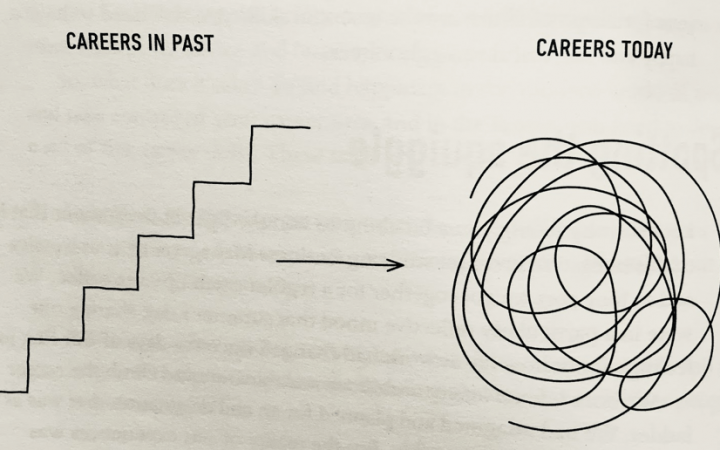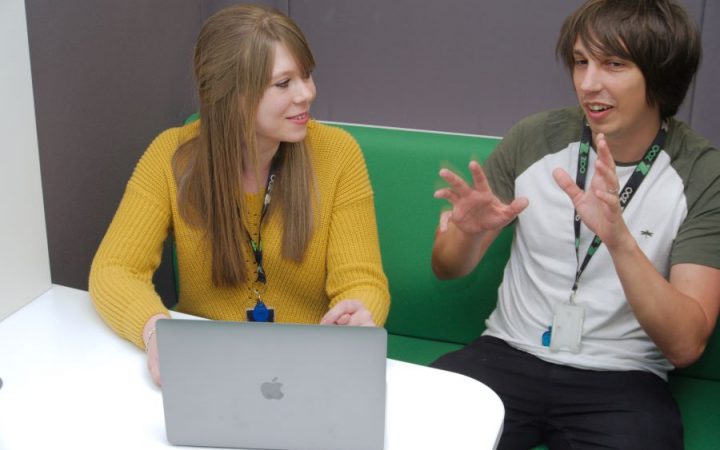
In part 2 of our Career Change series, we are looking at career moves within the sector. We hope this will be useful to those of you who are considering switching things up in your professional life, but have no desire to leave the tech and digital industries (you’re only human, after all). Maybe you’re getting restless in your current position or have lost the love for your day to day work. Perhaps your skills aren’t being used enough, or your role has or is soon to become redundant. Whatever your reasons, you aren’t limiting your options by staying in the tech sector – as we identified in part of one this series, the sector is recovering relatively well from this year’s events, and roles are very varied, demanding different skills and experience. In this post, we share the experiences of two people who have moved across different roles and have some useful insight and advice. Plus, we take a ‘deep dive’ into the area of DevOps, which brings together different disciplines and could be an option for those looking to apply technical skills in a different way.
What are sideways or squiggly career moves?
First things first, let’s bust some jargon. A sideways (or lateral) career move is generally considered to be “similar in responsibility and pay to the one you already have” (according to Indeed), and this can include moves within your existing company, or to a different place. The term ‘squiggly career’ stems from the idea that more of us now move “frequently and fluidly between roles, industries, locations and careers” and, rather than aspiring to move up a traditional career ladder, a squiggly mindset is: “how you think about your learning, development and growth in a more malleable, dynamic way.” Both of these quotes are taken from a Smart Insights blog which we found really helpful in understanding the squiggly concept.

Sideways and squiggly moves are brilliant for those in the tech and digital industries, because learning, adapting and developing sit right at the heart of both concepts. And in these industries, where technologies change and advance so quickly, adopting a squiggly mindset seems like the sensible thing to do.
Finding your place in an organisation
You might already work in a large tech company with different departments, where there could be lots of opportunities to learn new skills and explore different disciplines. Sophie Wendell is a Software Engineer at ZOO Digital, where she has worked since graduating more than five years ago.
Her first role at the company – which delivers localisation services, including dubbing and subtitling, to the media and entertainment industries – was as a Translation Coordinator. After two years, Sophie moved from the Languages Department to become a Project Coordinator in the Project Management Department, before moving back into Languages to progress to Languages Manager. Over two years ago, Sophie moved into Research and Development (R&D), which is where she works now. So, why all the moves? Sophie says,
“Until I got my current role, I was largely just exploring my options, trying things out to see what I enjoyed and to try and get new challenges. And then when I moved into software dev I found that I was constantly being challenged and having to learn new things and problem solve in different ways, which is what I’d been looking for in the other roles.”
Despite having three years’ company experience under her belt, moving into software development meant that Sophie was starting from scratch. She explains,
“When I started the Software Engineer role, ZOO took me on in a junior capacity in all but the job title, and supported me through the process of learning how to be a developer in a commercial environment with a lot of understanding and support from more experienced developers.
“My colleagues supported me from both sides during the switch. I had chats with R&D to get more information about the role, what was involved, and what they were looking for from me, and then from Production I had the full support of my manager who encouraged me to go for the role and endorsed me in a way that I will always be incredibly grateful for.”

Sophie’s cross-department experience has proven useful to the R&D team, as she brought insight into how Production works, including workflows, thinking processes, and the people who work in that part of the business. Her squiggly career path has also inspired others to do the same. She adds,
“I think I’ve shown that it’s possible for somebody with no technical background to learn the skills required and to fit in with how an R&D department works. We now have a couple of others who have made the move from Production into R&D and they’re excelling.”
As well as software development, Sophie recommends data science, product management/ownership, business analysis, and QA engineering as areas that non-technical people can move into – if you are prepared to learn and are part of, or are joining, a supportive and encouraging company.
“In these roles you can either do a lot of self-directed learning in your free time, or there are transferable skills from non-tech roles that can be applied to technical products. But possibly the biggest factor in whether they are ‘easy’ roles to move sideways into; is it a company that is willing to offer the support, training, and time to help with the transition and the learning process.”
Staying motivated in your work
Finding a job that matches your skillset is great, but if you get to the point where you stop feeling excited about your work – maybe it’s time to consider a move. Chad Gowler is an accessibility specialist at Home Office Digital, a role they have arrived at following a squiggly career path from their first job in software development.
Chad found that having ‘people skills’ and experience as a public speaker and mentor wasn’t helping them to stand out when looking for new roles. Chad also realised that their priorities weren’t aligned with those of other developers in the department, explaining,
“I felt that too many conversations were about technical nit-picking with very little care or focus on the result for the end user. I didn’t get excited about the other things developers around me got excited about, like new libraries or clean code or all of that stuff.”
Chad describes attending an NUX Conference in Leeds as ‘life-changing’, saying,
“All the talks about design, research, and being user centric really spoke to me. So I quit development, went to the University of York and did an MSc in Human-Computer Interactive Technologies.”
Chad continues,
“I had tried a year or so before to get into UX but without experience or qualifications it was impossible. During the MSc I saw an opportunity to apply for a user researcher internship in Sheffield at Home Office Digital and went for it, as entry-level user research jobs are very thin on the ground. Thankfully I got that position, then moved into a full time permanent position until the opportunity came up to move into accessibility.”
After exploring a few different areas of development, research and design, and being prepared to return to education and training to gain experience, Chad has found the perfect balance in accessibility, explaining,
“I’d been interested in accessibility for a while, and it really fits my broad skill set. Just as being a developer wasn’t people-focused enough for me, user research was too removed from the final product for me.”
A deep-dive into DevOps
Bringing skills, experience and insight from different disciplines within the tech industries can be beneficial in many new roles. Over summer, we noticed a fair few roles in DevOps popping up on our jobs board, so we wanted to find out more about what’s involved in this area of work, and who it may suit for a career move.
We spoke to the Head of IT and Support at 3Squared, Martin Gleadow, who is an expert on DevOps; to find out what it is, where it came from, who does it, and who might want to do it. He explains,
“DevOps is a term that was coined around 2008 to solve the problem of conflict between IT Operations and Development in a world where iterating faster and deploying more frequently was becoming increasingly important. The key individuals during the early days worked in consultant, project manager and senior technical operations and engineering roles. It grew out of a desire to learn from Agile software development – which in turn learned from Lean manufacturing – and apply the principles to Infrastructure and System Administration.
“Over time the term has evolved and become a job title in its own right rather than a movement of collaboration, but the principle is still the same: To facilitate efficient, effective and reliable business benefits from the application of technology, combining the expertise of software development and infrastructure management into a cohesive approach.”
According to Martin, being able to work in close cooperation with software engineering colleagues and understanding issues from different points of view, are essential to doing well in a DevOps role. So what kind of background might he expect a DevOps person to have?
“An analytical mindset, a broad picture view, and strong evaluation and reasoning skills will all help you go far in this field. A technical background is obviously important, but it does not have to be a traditional SysAdmin path – indeed people with a Development or a QA background are well suited to the requirements of a DevOps position. With so many applications being web-based, knowing how HTTP and other internet protocols work makes getting to grips with everything else easier, and hands-on database experience is also a bonus, as is programming or scripting experience.”
Learning and development motivates many people’s squiggly career choices and a role in DevOps will not be short in opportunities to expand your skill set. It is a broad field where you will get involved in bits of everything, and have lots of opportunities to learn, as Martin explains:
“Along with the understanding of how components fit together, DevOps has a strong focus on automation, configuration management and monitoring. Expect to learn about the different vendors and models that make up ‘cloud services’ and when (and how) to use them; what questions you need to ask and considerations you need to make when building infrastructure (especially around security, performance, scalability, cost, availability), and how to optimise these for budgets and requirements; as well as how you can automate the management of infrastructure using approaches including Puppet/Chef/Ansible/Salt, Terraform/AWS Cloud Formation/Azure Resource Manager and others.
“You’ll learn how to work closely with other roles involved in developing and delivering software, to decrease how long it takes to get a feature live and improve the quality of the software through build pipeline and test automation; and how to continually monitor the performance of a live application and ensure it keeps meeting requirements.”
Finally, we asked Martin what he wishes he knew before he made the move into DevOps. He says,
“If I were embarking on a similar career path today the thing it would be most useful to know is that ‘working in IT’ does not have to live up to the reputation generally held of it, and that a DevOps role is a rewarding position, where you can make a real difference and see the benefit of your work for many people who use the systems you are responsible for.”
If this has whetted your appetite and you’d like to know a bit more about DevOps, Sheffield has a dedicated DevOps meetup group, where you can speak to others about the role and their work. Meetups have been held less regularly throughout the COVID-19 crisis but keep an eye on the website and Twitter to hear about future events.
What next?
Sheffield Digital’s Slack community is a great place to ask questions about roles in the digital industries, there is always someone willing to help! If you haven’t read part one of our ‘Career Change’ series, then have a look. Part one is for those moving into the tech industries for the first time, however much of the information is relevant for people already in the sector; including some questions to ask yourself from a career change coach, a detailed look at project management, and some useful advice and resources if you’re learning how to code.
In the next post in our ‘Career Change’ series, we’ll be focusing on freelancers. So, if you’ve made the leap to freelance life in the digital industries and would like to contribute – please email claire@sheffield.digital.